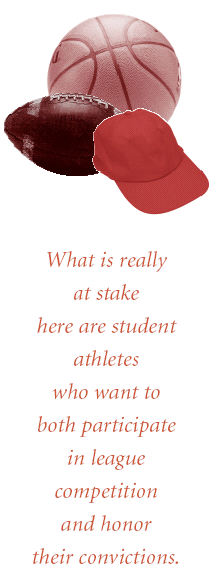Fair Game
Allen M. Jackson November/December 2003
Getting your Trinity Audio player ready...

By Allen M. Jackson
Woven into the warp and woof of American culture—a good swath of it, anyway—is the notion of athletics and fair play. For decades school sports have helped lift young people from obscurity into the limelight (Ronald Reagan, Brandi Chastain). And in some parts of the country—most notably Texas—football games all but take on the aura of an actual religious event.
Of course, athletic events can take place on days and at times inconvenient to some participants. In 1924 Scottish runner Eric Liddell refused to run in Olympic trials on a Sunday, much to the consternation of the prince of Wales and the United Kingdom. Liddell stood his ground and later won bronze and gold medals in track events at the Paris Olympics. Sandy Koufax, ace pitcher for the Los Angeles Dodgers, was one of the few Jewish baseball players to attract national fame and attention; his celebrity was further ensured when he refused to play on Yom Kippur, the Day of Atonement commanded in Leviticus. Entreaties from Dodger management were unavailing; Koufax spent the day fasting and praying. Several days later Koufax pitched more than 18 innings of baseball to lead the Dodgers to several victories. Such stories often become legendary—Liddell's experience was a major component of the Academy Award-winning motion picture Chariots of Fire—and in the telling confirm that principles are worth fighting for or maintaining. In 1995, in an echo of Liddell's stand, Eli Herring, a member of the Church of Jesus Christ of Latter-day Saints, turned down the National Football League draft and a potential multimillion-dollar contract with the Oakland Raiders because Herring, as The Wall Street Journal and Reader's Digest reported, wouldn't play football on Sunday. Almost 40 years after Koufax refused to play ball on Yom Kippur, another Jewish player for the Dodgers, Shawn Green, sat out a 2001 pennant race game against San Francisco in order to honor the Lord God on Yom Kippur.
Recently another case involving principle, athletics, and religious observance came to the fore, this time in Oregon. However, this wasn't a case of an athlete turning down a multimillion-dollar contract or seeking to take off a holy day. Rather, it was a group of young athletes at Portland Adventist Academy (PAA) asking both the state board of education and the Oregon School Activities Association, or OSAA, which manages competitive sports programs among the state's schools, to accommodate the Sabbathkeeping desires of the school's basketball team, the Cougars.

The issue might not have arisen had not the Cougars been a successful team. In 1996 the Cougars qualified for the state tournament and eventually won the championship. OSAA officials changed the semifinal game's time to Friday afternoon, allowing the team to play. However, it is argued, the body would not have made any further schedule adjustments, which meant the Cougars would have forfeited games they would have been required to play on Saturday morning or afternoon, time that is part of the seventh-day Sabbath observed by Adventists, as well as by Jews and by some Christians in other denominations and independent churches. (A Salvation Army church in Grants Pass, Oregon, has in recent years promoted Sabbath observance along with Sunday services, for example.)
What happened after the 1996 Cougar victory appears to have set in motion the current crisis: OSAA wanted the Adventist school to promise that it would not forfeit other games if the team gained a spot in future play-offs. School officials could not in good conscience sign a pledge such as that; they then went to the Oregon Department of Education and sought a ruling compelling OSAA to make "reasonable accommodation" for the students.
A hearing officer for the Department of Education found that OSAA had not done its best to help the students, but a full departmental hearing went against the Adventist students in February 2002. Three PAA students and their parents, represented by attorneys volunteering for the Oregon chapter of the American Civil Liberties Union, went to the state appellate court and asked for an order supporting their cause.
"Under the religious liberty guaranties of the Oregon Constitution, if the OSAA's practices infringe a student's religious beliefs, the OSAA must prove that its actions are the least restrictive means of furthering a compelling state interest," attorneys Charles F. Hinkle, Jeremy D. Sacks, and William R. Long wrote in their brief. "The religion clauses as well as the privileges and immunities clause of the Oregon Constitution prohibit the OSAA from treating one religion differently from another when it establishes the tournament schedule, and they prohibit the OSAA from treating religious factors differently from secular factors when it makes tournament scheduling decisions."
Fighting this request, attorneys for the state board of education (associated with the Department of Education) cited a former OSAA executive director who said the Portland Adventists must "adjust their thinking" to cooperate with other schools. Yet OSAA adjusted the start times of other play-off, tournament, and "consolation round" games to meet the needs of other parties, including a visiting team that arrived late the night before a contest, as well as regional television and radio broadcasters.
Jonathan M. Radmacher, an attorney representing the OSAA, told Liberty magazine that accommodating the seventh-day Sabbatarians would impose burdens on other schools in Oregon that would, in effect, make those schools observe a Saturday Sabbath.
However, argue attorney Hinkle and his colleagues, Oregon law requires more in the way of accommodation than is found in other states. And OSAA has for decades enforced rules banning competition on Sunday, the day of rest observed by the state's largest Christian faith, the Roman Catholic Church, and its second-largest, the Mormons. Therefore, attorney Hinkle and his colleagues argue, "OSAA is willing to accommodate religion, but not every religion," and that's not in keeping with the spirit—or the letter—of Oregon law.
But is such accommodation an "establishment of religion," as the OSAA argued? In June 2003 the Oregon court of appeals said it wasn't necessarily so, and asked the board of education to reevaluate the Adventist students' arguments.
"To require OSAA and the other participants in the Class 2A tournament to accommodate petitioner's religious obligations does not mean that they are endorsing petitioner's religious views, nor are they being discriminated against on religious grounds," the court said in its opinion. "There is no suggestion in the record that any proposed accommodation might cause a conflict with another participant's religious obligations."
Moreover, the three-judge appeals panel declared, "For the OSAA to require a person to choose between a religious obligation and participation in a covered activity, without first attempting to find a reasonable accommodation for the conflict, is to act in a way that is fair in form but discriminatory in operation." The ruling—a first in the nation—generated national headlines and not a little controversy.
Both the OSAA—which still contends that accommodating all religions would place undue burdens on the group and its member schools—and the state are considering a possible appeal of the court ruling directing the board to reexamine the issue. Attorney Hinkle believed such an appeal would be filed; attorney Radmacher said the matter was under consideration.
Although PAA principal Matthew Stanfill—himself a onetime high school athlete who chose Sabbath observance over sports advancement—lauded the ruling, he eventually resigned his job, noting that others in the school and local church administration were opposed to interscholastic competition overall, in part because of Sabbath concerns.
Many of the students in the original case have completed their high school education and are no longer able to participate in any benefits a new board of education decision might provide. And with the OSAA not willing—it seems—to back down, the fight may drag on even longer, Hinkle fears. Yet there seems to be no principle that OSAA is fighting for, he says, noting that what is really at stake here are student athletes who want to both participate in league competition and honor their convictions.
"We are a big enough and gracious enough country to be able to grant that request," Hinkle said.

______________________
Allen M. Jackson is a freelance writer living in Wheaton, Maryland.